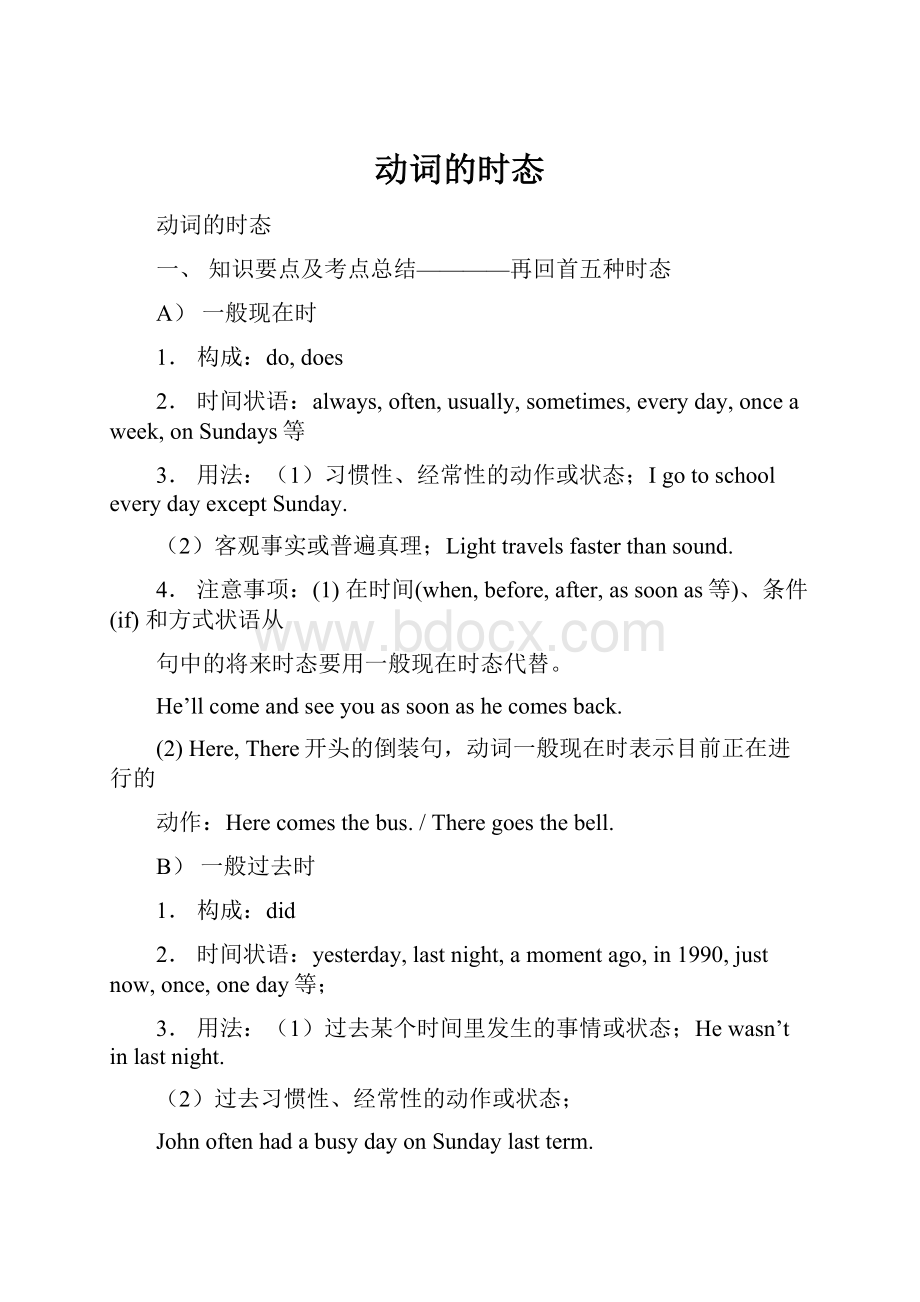动词的时态.docx
《动词的时态.docx》由会员分享,可在线阅读,更多相关《动词的时态.docx(15页珍藏版)》请在冰豆网上搜索。

动词的时态
动词的时态
一、知识要点及考点总结————再回首五种时态
A)一般现在时
1.构成:
do,does
2.时间状语:
always,often,usually,sometimes,everyday,onceaweek,onSundays等
3.用法:
(1)习惯性、经常性的动作或状态;IgotoschooleverydayexceptSunday.
(2)客观事实或普遍真理;Lighttravelsfasterthansound.
4.注意事项:
(1)在时间(when,before,after,assoonas等)、条件(if)和方式状语从
句中的将来时态要用一般现在时态代替。
He’llcomeandseeyouassoonashecomesback.
(2)Here,There开头的倒装句,动词一般现在时表示目前正在进行的
动作:
Herecomesthebus./Theregoesthebell.
B)一般过去时
1.构成:
did
2.时间状语:
yesterday,lastnight,amomentago,in1990,justnow,once,oneday等;
3.用法:
(1)过去某个时间里发生的事情或状态;Hewasn’tinlastnight.
(2)过去习惯性、经常性的动作或状态;
JohnoftenhadabusydayonSundaylastterm.
注:
此时常用usedtodo(过去常常)表示:
Heusedtoplayfootballatschool.
Thereusedtobealotoftreesaroundtheplace.
Hedidn’tusetolikedancing,butnowheisgettinginterested.
Didheusetogoswimming?
*beusedtosth/doingsth.习惯于:
Youmustbeusedtogettingupearly.
C)一般将来时
1.构成:
will/shalldo,begoingtodo
2.时间状语:
tomorrow,soon,nextweek,inafewminutes等
3.用法:
(1)客观上将来必然要发生的动作或状态,与主观意愿无关,常用will;
Mysisterwillbesixteennextmonth.
It’llbeMondaythedayaftertomorrow.
(2)说话人准备、打算要做的事或认为即将要发生的事,用begoingto;
I’mgoingtospendmyholidaysinLondon.
I’mgoingto(shall,will)attendameetingtomorrow.
*(3)beto+do表示安排好了要在将来做的事情;
ThefilmistobeonthisFriday.
*(4)beaboutto+do表示就要发生,不能接该动作发生的时间状语;
TheEnglisheveningisabouttobegin.
D)现在进行时
1.构成:
bedoing
2.时间状语:
now,today,Look!
Listen!
等;
3.用法:
(1)说话时或现阶段正在进行的动作或状态;
Don’tmakeanoise!
Myfatherissleeping.
WearereviewingourEnglishlessonsthesedays.
(2)come,go,leave,start,arrive,等动词的进行时态常可与将来时间连用表
示最近按计划或安排好要进行的动作。
TheyareleavingforBeijingatseventomorrowmorning.
(3)与always等副词连用表示反复出现或习惯动作,表示说话人的某种
感情,如赞扬、遗憾、讨厌或不满等。
Heisalwaysaskingformoney.
Whyareyoualwaysmakingsomuchnoise?
4.没有进行时态的词:
be(是),have(有),like,love,hate,want,hope,smell(闻起来),think,know,believe,hear,see,realize(意识到),understand,wish,belongto
(属于),dependon(取决于)等。
E)过去进行时
1.构成:
wasdoing
2.时间状语:
thistimeyesterday,atthattime,atsixo’clockyesterdayevening等
3.用法:
(1)过去某一个时刻或某段时间里正在进行的动作或状态;
Itwasrainingfromeighttotenlastnight.
Whatwereyoudoingthistimeyesterday?
4.注意事项:
was/weredoing+when+did;did+while+was/weredoing
Iwasdoingmyhomeworkwhenshecamein.
Icamehomewhilemotherwascooking.
二、新授一种时态————现在完成时
1.构成:
have/has+done(过去分词)
2.时间状语:
already,just,yet,ever,never,once,twice,recently,thesedays,since,inthepastfewweeks,for+一段时间,等
3.用法:
(1)过去发生或已经完成的某一动作对现在造成的影响或结果;
如:
I’vealreadyfinishedmyhomework.
Haveyoufinishedyourhomeworkyet?
Yes,Ihave./No,Ihaven’t.
HasTomhadhisbreakfastyet?
Yes,hehas.Hehasjusthadit.
(2)从过去已经开始,持续到现在的动作或状态,可一和从过去某一时刻
延续到现在的一段时间的状语连用。
如:
Shehasbeenillforthreedays.
Greatchangeshavetakenplaceinmyhometownsince1979.
比较:
*Since后面跟具体的时间,或者后面跟一个从句。
如:
Ihaveworkedheresince1989.
Hehaslivedheresincehecamehere.
Ihavebeeninthisschoolsincetwoyearsago.
*For后面接表示一段时间的短语。
Theyhavebeenherefortwoyears.
Ihavebeenastudenttherefornearlytwoandahalfyears.
Ihavekeptthelibrarybookforaweek.
=Ihavekeptthelibrarybooksinceaweekago.
*另外Itis/hasbeen+一段时间+since从句:
表示自从某事发生已有一段
时间了.
eg.Itis/hasbeentwoyearssincemybrotherjoinedthearmy.
4.试分析比较:
现在完成时和一般过去时的区别:
现在完成时表示过去发生的某一动作对现在造成的影响或结果,强调的是现在的情况,所以它不能和表示过去的时间状语连用,如yesterday,lastnight,threeweeksago,in1990等。
而一般过去时只表示过去的动作或状态,和现在不发生联系,它可以和表示过去的时间状语连用。
Ihaveseenthefilmalready.我已经看过这部电影了。
(言下之意:
我已经知道这
部电影的内容。
)
Isawthefilmyesterday.我昨天看了这部电影。
(只是说明看电影的时间或昨天做
的一件事)
HehasjustcomebackfromBeijing.他刚刚从北京回来。
(强调他现在已在这里)
HecamebackfromBeijingjustnow.刚才他从北京回来了。
(强调回来的具体时间)
Hediedin1993.他死于1993年。
(强调死亡时间)
Hehasbeendeadfortenyears.他已死了十年了。
(强调持续时间)
Helivedherein1973.1973年他住在这儿。
(不涉及现在是否住在这儿)
Hehaslivedheresince1973.1973年以来他就住在这儿。
(现在还住在这儿)
5.注意事项:
havebeento(曾去过某地);havegoneto(到某地去了)
Shehasbeentothelibrary.她去过图书馆。
(现在不在那儿了,可能回来了。
)
Shehasgonetothelibrary.她去图书馆了。
(人不在这儿,去图书馆了。
)
1.since引导的从句中动词用过去时
2.when引导的特殊问句不与现在完成时连用.
3.havegot/hasgot虽然是现在完成时,但havegot=have;hasgot==has
4.现在完成时中havebeento,havegoneto和havebeenin/at
(1)havebeento去过某地,表示某人的一种经历,可以和once,twice,already,
ever,never等连用.
eg.ShehasbeentoShanghaitwice.(表示目前人在这里)
(2)havegoneto去某地了,说话时某人已离开此地,在去某地的途中或已在某地,
eg.ShehasgonetoShanghai。
(表示现在她人不在这里)
(3)havebeenin/at逗留在某地(已经一段时间).常和fortendays,sinceIcame
here等连用.
eg.ShehasbeeninShanghaisinceshemovedthere
6.过去分词构成:
(1)规则动词的过去分词构成和动词过去式相同。
(2)部分常用不规则过去分词:
原形
过去式
过去分词
原形
过去式
过去分词
原形
过去式
过去分词
Buy
bought
bought
win
won
won
take
took
taken
Find
found
found
sit
sat
sat
eat
ate
eaten
Get
got
got
sleep
slept
slept
go
went
gone
Have
had
had
spend
spent
spent
see
saw
seen
Hear
heard
heard
stand
stood
stood
speak
spoke
spoken
Leave
left
left
teach
taught
taught
am,is
was
been
Lose
lost
lost
think
thought
thought
are
were
been
Make
made
made
cut
cut
cut
become
became
become
Meet
met
met
put
put
put
break
broke
broken
Send
sent
sent
read
read
read
choose
chose
chosen
Sweep
swept
swept
set
set
set
draw
drew
drawn
Tell
told
told
shut
shut
shut
fall
fell
fallen
Feel
felt
felt
let
let
let
drive
drove
driven
Say
said
said
hit
hit
hit
ride
rode
ridden
Catch
caught
caught
cost
cost
cost
swim
swam
swum
Build
built
built
do
did
done
begin
began
begun
Bring
brought
brought
come
came
come
drink
drank
drunk
Sell
sold
sold
give
gave
given
sing
sang
sung
Lend
lent
lent
know
knew
known
fly
flew
flown
Keep
kept
kept
blow
blew
blown
forget
forgot
forgotten
Hold
held
held
throw
threw
thrown
wear
wore
worn
Mean
meant
meant
show
showed
shown
write
wrote
written
wake-----waked,woke-------waked,woke,woken;shine-----shone,shined----shone,shined
smell----smelt,smelled-----smelt,smelled;learn----learned,learnt------learned,learnt
7.延续性动词
1.英语动词根据词义可分为两种,一种是延续性的,一种是终止性的,终止性动词(也可称为非延续性动词,瞬间动词,或点动词),如begin,start,die,buy,leave,come等,表示动作的发生与结束于一瞬间完成,不能再延续,所以它的现在完成时不能和表示延续的时间状语连用,即不能与表示一段时间的状语,for+时间段,since+时间点/从句连用,也不能用在howlong引导的特殊疑问句中.
e.g.I'veleftShanghaiforthreedays.(×)
I'vebeenawayfromShanghaiforthreedays.(√).
IleftShanghaithreedaysago.(√)
Itis/hasbeenthreedayssinceIleftShanghai.(√)
2.初中英语课本中常见终止性动词有:
leave,go,come,arrive,begin,buy,borrow,die,
join,become等.终止性动词要表示持续时,可用以下方法:
⑴.将时间状语改为时间段+ago,句中谓语动词用一般过去时.
eg.我弟弟参军两年了.Mybrotherjoinedthearmytwoyearsago.
=Mybrotherhasbeeninthearmyfortwoyears.
=Mybrotherhasbeenasoldierfortwoyears.
⑵.若保留for+时间段,since+时间点/从句,或用在howlong句型中,则需将终止性
动词改为相应的状态动词或延续性动词
常见终止性动词与延续性动词(或状态动词)的对应关系如下:
瞬间动词
延续性动词
瞬间动词
延续性动词
Buy
have
end/finish
beover
Open
beopen
catchacold
haveacold
Die
bedead
jointhearmy
beinthearmybeasoldier
Close
beclosed
jointheParty
beinthePartybeaPartymember
Leave
beaway(from)
puton
wear
Borrow
keep
become
be
begin/start
beon
fallasleep
beasleep
come/go/arrive/get/reach/move
bein/at
现在完成时的典型错误分析
1.你看过这部电影了吗?
误:
Didyouseethefilm?
正:
Haveyouseenthefilm?
析:
see是发生在谈话以前某一没有明确指明的时间,但该动作所产生的结果现在还存在,即对电影内容
了解。
所以要用现在完成时。
2.你什么时候学会这个词?
误:
Whenhaveyoulearnttheword?
正:
whendidyoulearntheword?
析:
疑问副词一般不能与现在完成时连用。
3.——你看这部电影了吗?
——看过了。
——你在哪儿看的?
——我在北京看的。
——Haveyouseenthefilm?
——YesIhave.
误:
——Wherehaveyouseenit?
——IhaveseenitinBeijing.
正:
——Wheredidyouseeit?
——IsawitinBeijing.
析:
两人对话时常用现在完成时询问,但一旦情况了解了,侧重点便转入过去动作本身,这时就要用一
般过去时了。
4.我买了本新词典,但现在丢了。
误:
IhaveboughtanewdictionarybutIhavelostit.
正:
IboughtanewdictionarybutIhavelostit.
析:
从“havelost”可以知道“buy”这个过去发生的动作对现在影响已不存在了,所以不能用现在完成时,
如果用现在完成时,显然前后产生矛盾。
5.他去北京三年了。
误:
ItwasthreedayssinceheleftforBeijing.
正:
It's或hasbeenthreedayssinceheleftforBeijing.
析:
“it…+若干时间+since…”句型里,主句一般用一般现在时,也可以用现在完成时。
Since从句的时
态要用一般过去时。
6.李明曾在这儿住过。
误:
LiMinghasoncelivedhere.
正:
LiMingoncelivedhere.
析:
once当“曾经”解时,表示有过某种经验经历,要用一般过去时,如果要用现在完成时,可以把once改为ever,如LiMinghaseverlivedhere.
练习题
(一):
1.Ihaveboughtadictionary.
否定句:
一般问句:
回答:
2.Hisfatherhasbeendeadforthreeyears.
否定句:
一般问句:
回答:
提问:
3.Ihavealreadylearned2,000Englishwords.
否定句:
一般问句:
回答:
提问:
4.Haveyougotapen?
=
5.I’vegotaheadache.=
练习题
(二):
1.It'salongtimesincewe__________(meet)last,isn'tit?
2.----Iknowyou___________(choose)apicturebookamongthese.
----Yes,Havealookatit,please.
3.Sofar,spaceshipswithoutpeople___________(reach)themoonandsomeotherpartsof
theuniverse.
4.Myfather_______homefornearlythreeweeks.
A.hasgoneawayfromB.hasleft
C.hasbeenawayfromD.wentaway
5.MrandMrsGreenhave_________inChinaforaweek.
A.beenB.gotC.arrivedD.reached
6.-----Where'sMary?
-----Oh,she_________thelibrary.
A.hasgoneto B.wentto C.hasbeento D.hadgoneto
7.I'mnotfeelingwell.I'vecaughtacoldforthreedays.
A B C D
8.TomhascaughtabadcoldfordaysandhehasstayedinbedsincelastSaturday.
A B C D
三、与时态有关的疑难解答
时态的呼应
1.主句中谓语动词如果是现在时或将来时,从句中的谓语动词可以用任何所需要的时态,
Hesaysthathewantstospeaktotheheadmaster.
hewon'tbefreetomorrow.
hecamelastnight.
2.主句中的谓语动词如果是过去时态,从句中的谓语动词一般情况下要用过去时态的某种形式.
HesaidthathewasworkinghardonhisChinese.
hehadaverygoodjourney